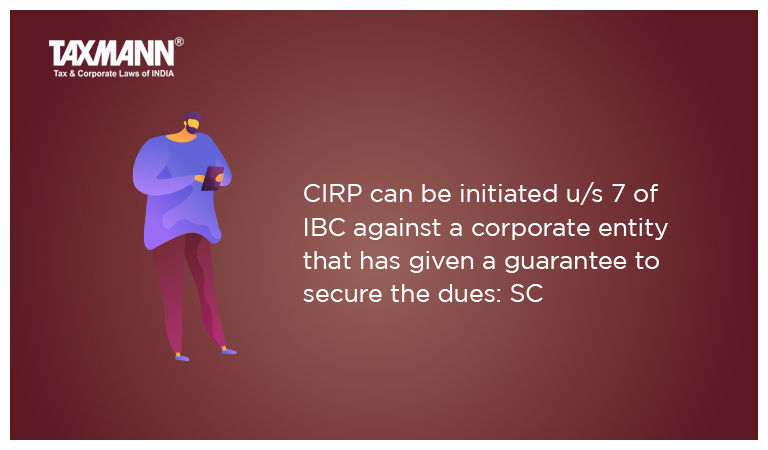CIRP can be initiated u/s 7 of IBC against a corporate entity that has given a guarantee to secure the dues: SC
- Blog|News|Insolvency and Bankruptcy Code|
- 2 Min Read
- By Taxmann
- |
- Last Updated on 9 September, 2022

Case Details: K. Paramasivam v. Karur Vysya Bank Ltd. - [2022] 142 taxmann.com 158 (SC)
Judiciary and Counsel Details
-
- Indira Banerjee & J.K. Maheshwari, JJ.
Facts of the Case
In the instant case, an appeal was filed against the order passed by the appellate authority (NCLAT) whereby the judgement passed by the Adjudicating Authority (NCLT) for initiation of the CIRP against the corporate debtor was dismissed.
The appellant was the promoter, shareholder and suspended/discharged director of the corporate debtor – Maharaja Theme Parks and Resorts, a company registered under the Companies Act, 1956.
The financial creditor had advanced credit facilities to three entities, namely, Sri Maharaja Refineries, a Partnership Firm, Sri Maharaja Industries, a prioprietory concern of K. Paramasivam; and Sri Maharaja Enterprises, a proprietary concern of P. Sathiyamoorthy.
The corporate debtor stood guarantor for the loans availed by all the three borrowers. The borrowers failed to repay the debts payable by them to the financial creditor. Thereafter, the financial creditor filed an application u/s 7 of the IBC for initiation of the CIRP against the corporate debtor.
The corporate debtor contended that the company was not a corporate debtor which is defined in section 3(8) of the IBC to mean, “a corporate person who owes a debt to any person” and thus objected to the jurisdiction of the Adjudicating Authority (NCLT) to entertain the petition u/s 7 of the IBC.
In addition to this, the appellant contended that the company doesn’t fall within the definition of ‘Corporate Guarantor’ in terms of section 5(5A) of the IBC, which read as ‘corporate guarantor’ means a corporate person who is the surety in a contract of guarantee to a corporate debtor.” Further, it was submitted that the company had not guaranteed any loan given to a corporate person.
The NCLT admitted the petition u/s 7 of the IBC and initiated the CIRP against the corporate debtor. Thereafter, an appeal was filed to the Appellate Authority (NCLAT). The NCLAT by the impugned order dismissed the petition.
It was submitted that the appeal filed by the appellant u/s 61 of the IBC was dismissed by the Appellate Authority (NCLAT) on the ground that the company was a Corporate Guarantor, without considering the fact that the company does not fall within the ambit of the definition of Corporate Guarantor, and therefore CIRP cannot be initiated against it.
Then, an appeal was made to the Supreme Court against the order passed by the Appellate Authority (NCLAT). Now, the question arises as to whether an action u/s 7 of the IBC can be initiated by a financial creditor against a corporate entity that has given a guarantee to secure the dues of a non-corporate entity or not
Supreme Court Held
The Supreme Court held that the CIRP can be initiated u/s 7 of the IBC against a corporate entity who has given a guarantee to secure the dues of a non-corporate entity as a financial debt accrues to the corporate person, in respect of the guarantee given by it, once the borrower commits default. The guarantor is then, the Corporate Debtor.
In view of the above, the CIRP can be initiated against the Corporate Guarantor without proceeding against the principal borrower.
Disclaimer: The content/information published on the website is only for general information of the user and shall not be construed as legal advice. While the Taxmann has exercised reasonable efforts to ensure the veracity of information/content published, Taxmann shall be under no liability in any manner whatsoever for incorrect information, if any.

Taxmann Publications has a dedicated in-house Research & Editorial Team. This team consists of a team of Chartered Accountants, Company Secretaries, and Lawyers. This team works under the guidance and supervision of editor-in-chief Mr Rakesh Bhargava.
The Research and Editorial Team is responsible for developing reliable and accurate content for the readers. The team follows the six-sigma approach to achieve the benchmark of zero error in its publications and research platforms. The team ensures that the following publication guidelines are thoroughly followed while developing the content:
- The statutory material is obtained only from the authorized and reliable sources
- All the latest developments in the judicial and legislative fields are covered
- Prepare the analytical write-ups on current, controversial, and important issues to help the readers to understand the concept and its implications
- Every content published by Taxmann is complete, accurate and lucid
- All evidence-based statements are supported with proper reference to Section, Circular No., Notification No. or citations
- The golden rules of grammar, style and consistency are thoroughly followed
- Font and size that’s easy to read and remain consistent across all imprint and digital publications are applied



 CA | CS | CMA
CA | CS | CMA
